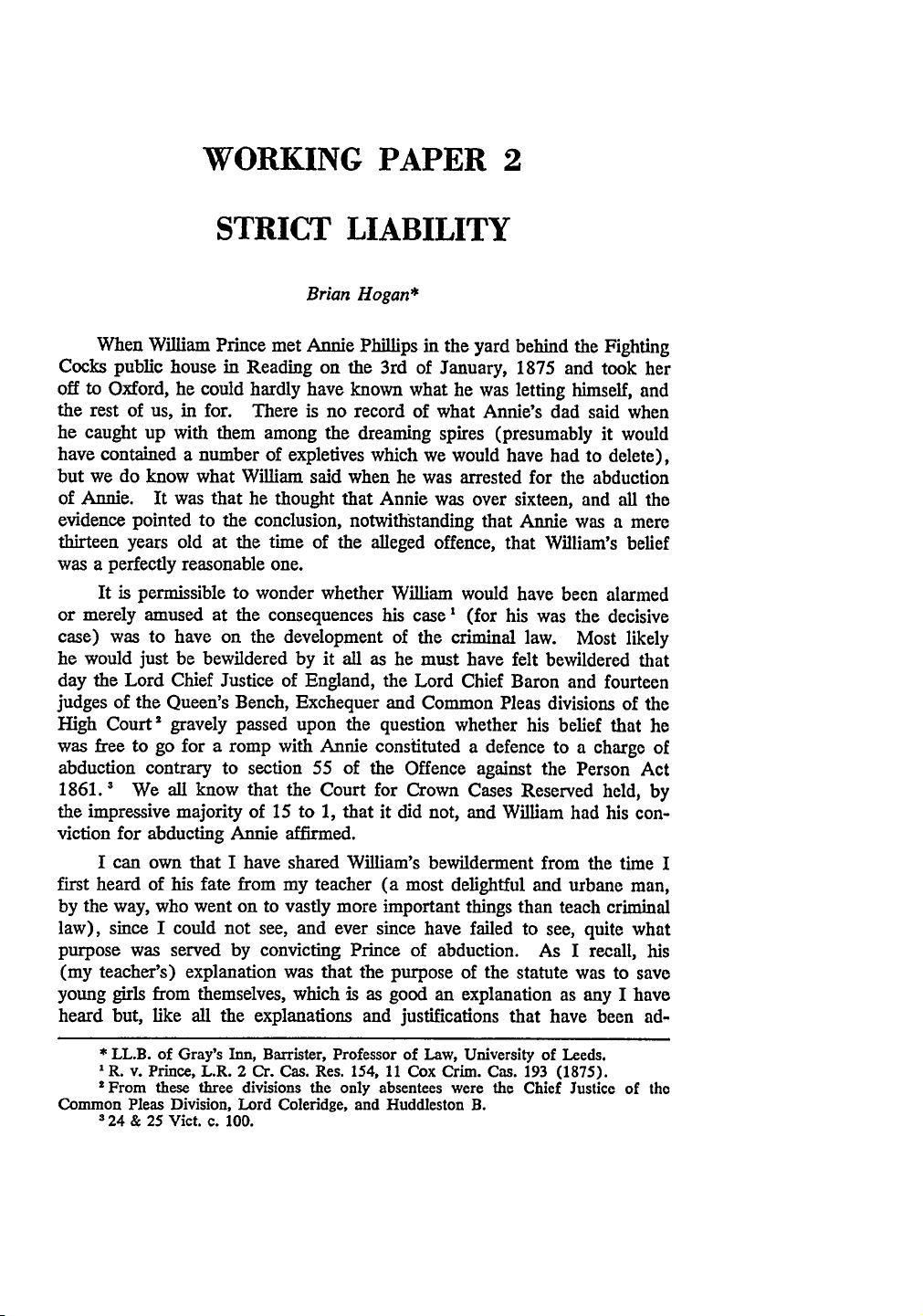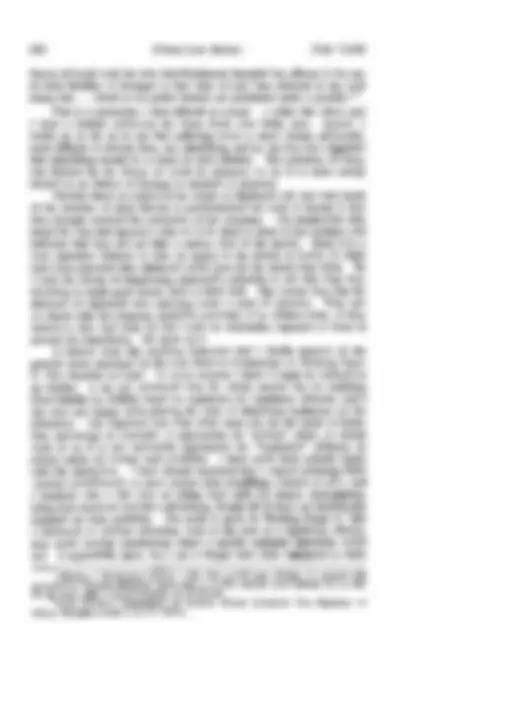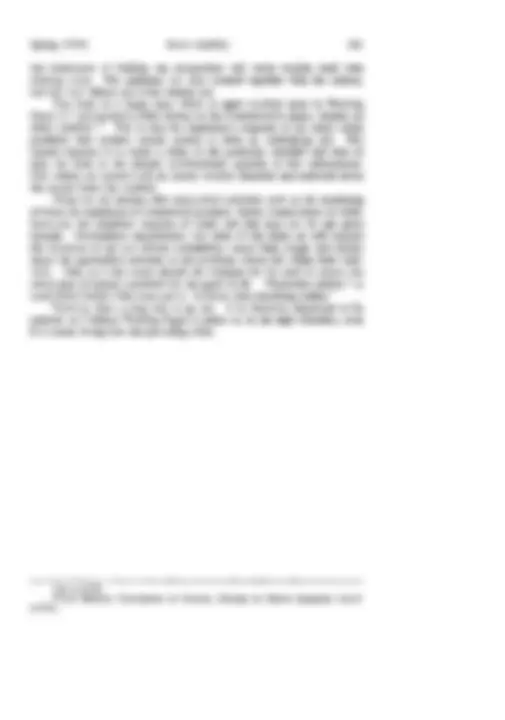




Study with the several resources on Docsity

Earn points by helping other students or get them with a premium plan


Prepare for your exams
Study with the several resources on Docsity

Earn points to download
Earn points by helping other students or get them with a premium plan
Community
Ask the community for help and clear up your study doubts
Discover the best universities in your country according to Docsity users
Free resources
Download our free guides on studying techniques, anxiety management strategies, and thesis advice from Docsity tutors
This working paper explores the concept of strict liability in criminal law through the historical case of r. V. Prince. The author discusses the implications of prince's conviction for abduction and the subsequent development of the doctrine of strict liability. The paper also critiques the use of strict liability in regulatory offenses and its impact on law enforcement and simplification of the law.
What you will learn
Typology: Slides
1 / 4

This page cannot be seen from the preview
Don't miss anything!



Brian Hogan*
When William Prince met Annie (^) Phillips in the yard behind the Fighting Cocks public house in Reading on the 3rd (^) of January, 1875 and took her off to Oxford, he could hardly (^) have known what he was letting himself, and the rest of us, in for. There is no record of what Annie's dad said when he caught up with them (^) among the dreaming spires (presumably it would have contained a number of expletives which we would have had to delete), but we do know what William said when (^) he was arrested for the abduction of Annie. It was that he thought that Annie was over sixteen, and all the evidence pointed to the conclusion, notwithstanding (^) that Annie was a mere thirteen years old at the time of the alleged offence, that William's belief was a perfectly reasonable one. It is permissible to wonder whether William would have been alarmed or merely amused at the consequences his case ' (^) (for his was the decisive case) was to have on the development of the criminal law. (^) Most likely he would just be bewildered by it all as he (^) must have felt bewildered that day the Lord Chief Justice of England, the Lord Chief (^) Baron and fourteen judges (^) of the Queen's Bench, Exchequer and Common Pleas divisions of the High Court' (^) gravely passed upon the question whether his belief that he was free to go for a romp with Annie constituted a defence to a charge of abduction contrary to section 55 of the Offence against the Person (^) Act 1861.' We (^) all know that the Court for Crown Cases Reserved held, by the impressive majority of 15 to 1, that it did not, and William had his con- viction for abducting Annie affirmed.
I can own that I have shared William's bewilderment from the time I first heard of his fate from my teacher (a most delightful (^) and urbane man, by the way, who went on to vastly more important things than teach criminal law), since I could not see, and ever since (^) have failed to see, quite what purpose was served by convicting (^) Prince of abduction. As I recall, his (my teacher's) explanation was that the purpose of the statute (^) was to save young girls from themselves, (^) which is as good an explanation as any I have heard but, like all the explanations and justifications that have been ad- ***** LL.B. of (^) Gray's Inn, Barrister, Professor of Law, University of Leeds. 'R. v. Prince, (^) L.R. 2 Cr. Cas. Res. 154, 11 Cox Crim. Cas. 193 (1875). ' From these three divisions the only absentees were the Chief Justice of the Common Pleas Division, Lord Coleridge, and Huddleston B. ' (^24) & (^25) Vict. c. (^) 100.
Strict Liability
vanced in defence of strict liability, it does not bear scrutiny. Annie had no wish to be saved from herself (she told William that^ she^ was^ eighteen)^ and while we may be able to save girls from deliberate, reckless,^ or^ even^ neg- ligent, abduction, there is nothing that can be done to save them from a genuine mistake. The courts recognised this fact in abduction cases where a genuine and reasonable mistake was made by inflicting only a nominal penalty. And what purpose was served by the conviction? Would it serve as a warning so that Prince would not make the same mistake again? It cer- tainly seems logical to assume that Prince was thereafter more circumspect in his dealings with young women, but the Court for Crown Cases Reserved said he was to be liable no matter how careful he was. There is no known way of teaching a man not to make a reasonable mistake a second time. Prince, however, involved a "serious" crime^ punishable^ by^ imprison- ment and, on the^ whole,^ strict^ liability^ is^ more^ commonly^ reserved^ for "regulatory" offences (^) where the fine (^) is the normal penalty. (^) Here, it is said, strict liability is more obviously defensible.^ Protagonists^ claim^ that,^ without the imposition of strict liability, the enforcement of the law would be severely handicapped and that strict liability simplifies law enforcement and^ means that trials can be conducted speedily and cheaply. There is no need for me to rehearse the countervailing arguments-these are comprehensively documented in the Law Reform Commission's Working Paper 2-but I do wish to deny,^ and^ deny emphatically,^ that^ strict^ liability ever led^ to^ a simplification of the law. In England, and the position is no better in Canada, there is no discernible pattern even within the field of regulatory offences which enables the ordinary lawyer to predict with any measure of confidence whether a particular offence will be held to be one of strict liability or not. Few^ areas^ of^ the^ criminal^ law^ have^ spawned^ so^ much litigation and so little of it is edifying. I suppose, though, that this objection might be met by more precise drafting or by expressly labelling certain offences as offences of strict liability. But my objection would still remain, and I can do no better than illustrate it by reference to the recent decision of the House of Lords in Alphacell Ltd. v. Woodward. ' Under section 2(1) of^ the Rivers^ (Prevention^ of^ Pollution) Act 1951, 6 it is an offence if a person "causes... to enter a stream any poisonous noxious or polluting matter.. ." and it was held that^ the^ appellants had been properly convicted where effluent overflowed from their settling tanks into a river. The overflow was attributable to the blockage of certain pumps by debris brought down by the river but it was held that, even as- suming the appellants had not been negligent, they were^ guilty^ of^ the^ offence because their operations had caused the effluent to enter the stream. The
4Prince was^ directed^ to come^ up^ at^ the^ next^ (Kingston)^ assizes^ for^ sentence where (presumably) some nominal sentence was imposed. '[1972] A.C. 824. 6 14 & 15 Geo. 6, c. 64.
Spring 1975]
Strict Liability
the touchstone of liability, the prosecution will rarely trouble itself with proving more. The negligent are then lumped together with the callous, and the real villians are never singled out. This leads to a larger issue which is again touched upon in Working Paper 2, ' and pursued a little farther in the Commission's paper, Studies on Strict Liability. (^10) This is that the legislature's response to the many social problems that modem society spawns is often (^) an unthinking one. The typical response is to make a crime of the particular mischief and then to pass the buck to the already overburdened (^) agencies of law enforcement. New crimes are created with an almost reckless abandon and scattered about the statute book like confetti. When we are dealing with many-sided (^) activities such as the marketing of food, the regulation of commercial practices, fishery conservation or what- have-you, the simplistic (^) response of crime and fine may not be just good enough. Government departments-for tasks (^) of this kind are well beyond the resources of any law reform commission-must think longer and harder about the appropriate solutions to the problems which fall within their baili- wick. Only as a last resort should the criminal law be used to secure the observance of proper standards for the good of all. "Preventive justice," as Lord Chief Justice Coke once put it, "is better than punishing justice." There is, then, a long way to go yet. It is, however, (^) important to be pointed, as I believe Working Paper 2 points us, in the right direction, even if it means facing into the prevailing wind.
9Id. "0LAw at 31-32.REFORM COMMISSION OF CANADA, STUDIES ON S-icr I~ABu-rrv 145- (1974).
Spring 1975]